Natamycin: A Natural Solution for Food Preservation
2024-12-27
Natamycin, a naturally occurring antifungal agent, has become an essential ingredient in the global food industry. Derived from the soil bacterium Streptomyces natalensis, this compound offers a safe and effective way to extend the shelf life of food products by preventing fungal growth. This blog provides an in-depth look at Natamycin, its mechanism of action, and its applications in food preservation.
What Makes Natamycin Effective?
Natamycin is a polyene macrolide antifungal compound. Its mechanism is highly specific—it binds to the sterols in fungal cell membranes, disrupting their structure and function. This inhibits the growth of molds and yeasts without killing them outright, reducing the risk of developing resistance. Unlike some other preservatives, Natamycin does not interfere with bacterial growth, making it an excellent choice for preserving fermented foods where beneficial bacteria are essential.
Applications in the Food Industry
Natamycin is versatile and effective in protecting a wide range of food products from fungal spoilage.
1. Cheese: One of the most common applications is in cheese production. Natamycin is often sprayed on the surface of cheese or incorporated into wax coatings to prevent mold growth during aging and storage.
2. Baked Goods: Natamycin helps maintain the freshness of bread, cakes, and pastries by inhibiting mold and yeast growth.
3. Processed Meats: Natamycin is used to extend the shelf life of sausages, cured meats, and other processed meat products.
4. Beverages: Fruit juices and other acidic drinks prone to yeast contamination can benefit from the antifungal properties of Natamycin.
5. Dairy Products: Beyond cheese, Natamycin is used in yogurt and cream-based products, where it helps preserve quality without affecting the activity of live bacterial cultures.
Why Choose Natamycin?
- Natural Origin: As a naturally derived compound, Natamycin appeals to consumers seeking clean-label products.
- Low Concentration: Natamycin is effective at very low concentrations, minimizing its impact on the sensory qualities of food.
- Broad Spectrum: It protects against a wide range of molds and yeasts.
- Safety: Approved by major regulatory bodies like the FDA and EFSA, Natamycin is non-toxic and safe for consumption.
Challenges in Using Natamycin
Despite its advantages, Natamycin has some limitations:
- Surface Activity: It primarily works on the surface of foods and does not penetrate deeply into the product.
- Water Solubility: Its low solubility in water may limit its application in certain liquid products.
Natamycin is a powerful, natural preservative that helps the food industry combat fungal spoilage effectively. As consumer demand for natural and sustainable food additives grows, Natamycin is poised to become even more integral to food preservation strategies.



